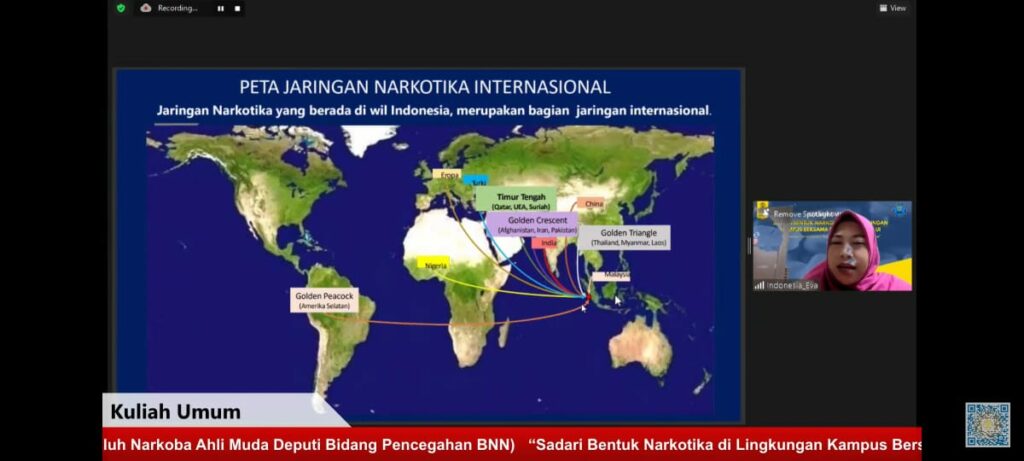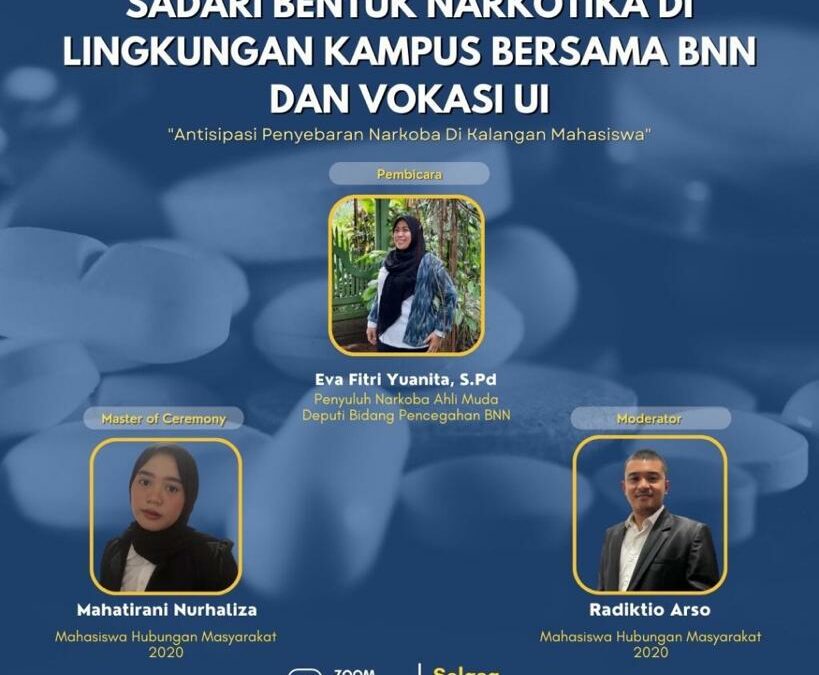The problem of drug abuse and distribution currently threatens all levels of society, including in the educational environment. Drug abuse that occurs today is mostly motivated by VUCA conditions (Volatility, Uncertainty, Complexity, and Ambiguity). It was conveyed by the Young Expert Drug Counselor, Deputy for Prevention of the Indonesian National Narcotics Board (BNN), Eva Fitri Yuanita, S.Pd., in a public lecture held by the Public Relations Study Program, Vocational Education Program, Universitas Indonesia (UI) on, May 31, 2022.
“Moreover, the changing conditions in various aspects of life today and coupled with the Covid-19 pandemic that has occurred, has made drug problems a lot more common, including among students,” said Eva.
Until now, there are 1,047 types of New Psychoactive Substances (NPS) circulating in the world, and 75 types of NPS have been regulated in the Indonesian Health Government Regulation Number 2 and Number 4 of 2021 concerning Determination and Changes in Classification of Psychotropics. In addition, several countries included in the narcotics network in Indonesia are also part of an international network, namely Golden Peacock (United States), Nigeria, Europe, Turkey, Middle East (Qatar, Saudi Arabia, Syria), Golden Crescent (Afghanistan, Iran, Pakistan), Golden Triangle (Thailand, Myanmar, Laos), and Malaysia.
 (Photo: Eva explains the map of the international narcotics network)
(Photo: Eva explains the map of the international narcotics network)
“In drug abuse, there are usually several stages that occur in individuals until they become addicts, namely experimental use, namely the use of just fulfilling curiosity; recreational use, namely use with the purpose of socializing when gathering with friends; situational use, ie use triggered by the urge to reuse (dependence); intensive use, daily use that has an impact on social/work functions; and dependent use, the use to relieve discomfort, such as pain, disappointment, and depression,” said Eva.
The strategy and policies carried out by the BNN are currently in the form of a war against drugs in order to create a Indonesia Bersinar (Bersih Narkoba) (Drug Free). This includes eradication, prevention, community empowerment, rehabilitation, and the use of technology, and cooperation with various stakeholders to achieve these targets. In addition, the role of the closest people is also quite effective in preventing the spread of drugs, with a non-judgmental approach.
 (Photo: Discussion between Eva and the audience regarding the dangers of drugs)
(Photo: Discussion between Eva and the audience regarding the dangers of drugs)
Head of the Public Relations Study Program, Mareta Maulidiyanti, S.Sos., M.M., said that the collaboration between UI Vocational and BNN was a form of cooperation in disseminating information and awareness of the dangers of drug distribution and distribution, especially among students. “As students of the Public Relations study program, they can learn how to bridge the information that stakeholders in the government want to convey to the community through this collaboration program. In addition, I also hope that in the future the collaboration program between UI Vocational and BNN can continue and expand to other fields,” said Mareta.


